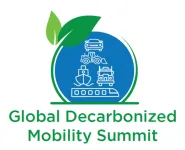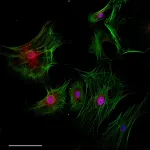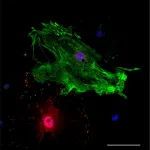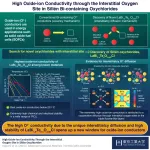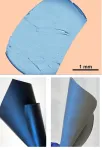(Press-News.org) SAN ANTONIO – 4.19.23 —Southwest Research Institute (SwRI) will host the inaugural Global Decarbonized Mobility Summit (GDMS) on Nov. 13-17. The multi-day summit will bring together key stakeholders in the transportation industry to discuss technology challenges associated with sustainable decarbonized mobility solutions for on-and-off-road applications.
The GDMS will assemble industry members from SwRI’s many automotive-related consortia and joint industry projects at its San Antonio headquarters. Throughout the summit, SwRI staff experts will hold sessions on the latest research and development advancements, pathways for lowering emissions through decarbonization, and how the industry can meet the latest technology challenges associated with lowering greenhouse gas emissions.
“The Global Decarbonized Mobility Summit aims to highlight a wide range of innovative research, developments and demonstrations of solutions currently happening in this space,” said Chris Bitsis, manager of the Institute’s Commercial Vehicles R&D Team. “The Institute has a long history of guiding collaborative programs that help clients pool resources and funding, enabling SwRI’s next-generation research to reduce or eliminate emissions.”
SwRI currently has nearly a dozen consortia programs that address various aspects of future mobility. The Institute possesses over 50 years of experience working with regulatory agencies to address ongoing emissions challenges and ensure new developments meet regulatory standards, such as the U.S. Environmental Protection Agency’s recently proposed Phase III Greenhouse Gas Rules and the California Air Resources Board’s NOX regulations for 2027.
The summit will begin with regular project status meetings for consortia members. On Nov. 14, GDMS will open the summit to non-consortia members from automotive, transportation, manufacturing, and other mobility sectors to learn about innovative decarbonization technologies. Programming will include expert-led sessions regarding SwRI internal research on the future of mobility as well as tours of the campus and a local automotive plant.
The ninth phase of the Clean Highly Efficient Decarbonized Engines (CHEDE-9) Consortium will kick off on Nov. 15, celebrating over three decades as the industry’s longest-running advanced engine research consortium. CHEDE-9’s launch will provide an opportunity for the industry to learn about the latest engine decarbonization technologies for mobility and transportation.
The summit will also feature the second annual Life-Cycle Analysis for Transportation Symposium on Nov. 16-17. This unique, two-day event will highlight academic, industry and institutional research efforts to characterize total emissions produced during the entire life cycle of a vehicle, including its manufacture, service life and recycling or disposal.
“The Global Decarbonized Mobility summit is framed around SwRI’s consortia programs, but it provides an opportunity for all industry professionals to gain an understanding of the innovation happening in the transportation sector,” said Dr. Graham Conway, SwRI staff engineer.
The Global Decarbonized Mobility Summit is open to industry professionals and members of SwRI consortia and JIPs. For more information about the GDMS, contact Chris Bitsis. Contact Graham Conway to inquire about speaking at the Life-Cycle Analysis for Transportation Symposium. Registration details will be announced later this summer.
For more information, visit https://gdms.swri.org or watch an event video. (Link is external)
END
SwRI launches the Global Decarbonized Mobility Summit Nov. 13-17
Inaugural summit to assemble transportation industry, consortia members to discuss challenges, solutions to decarbonizing mobility
2023-04-19
ELSE PRESS RELEASES FROM THIS DATE:
Nebraska-led study first to define anxiety spiraling from national election
2023-04-19
Researchers are beginning to better understand the toll of polarized politics on mental and physical health, and a new study suggests that Americans’ political anxiety crescendos before a major election.
Led by University of Nebraska–Lincoln political scientist Kevin Smith, with Aaron Weinschenk of the University of Wisconsin–Green Bay and Costas Panagopoulos of Northeastern University, the study is the first to examine anxiety tethered to a specific political event — the 2020 presidential election, touted by both sides as the ...
A second chance for a healthy heart
2023-04-19
A recent study using mice has revealed a way to turn back the clock after heart attack. The researchers behind the work used RNAs to instruct cells in an injured heart to eliminate scar tissue and recreate cardiac muscle, allowing the heart to function like new again.
Cardiovascular disease, including heart attack, is the leading cause of death worldwide.
“Adult human hearts are not very good at repairing themselves,” said Conrad Hodgkinson, an associate professor of medicine and pathology at Duke University School of Medicine who oversaw the study. “Once they have a heart attack or any type of damage, ...
Study explores prosocial behavior within, between religious groups
2023-04-19
Does a commitment to one’s God facilitate altruistic behavior that benefits only members of the same religious group? Or does it extend to helping members of a different religion?
University of Illinois Chicago social psychologist Michael Pasek and colleagues examined this question through field and online experiments involving more than 4,700 people from diverse ethnoreligious populations in three political and cultural contexts.
Christians, Muslims, Hindus and Jews in the Middle East, Fiji and the United ...
Bad medical news causes patients to choose brand name drugs over generics, costing billions
2023-04-19
Researchers from Johns Hopkins University published a new Journal of Marketing article that examines how receiving negative medical results might affect how people choose between generic and brand name drugs.
The study, forthcoming in the Journal of Marketing, is titled “Does Bad Medical News Reduce Preferences for Generic Drugs?” and is authored by Manuel Hermosilla and Andrew T. Ching.
At the height of the COVID-19 pandemic, Manuel Hermosilla received a call from a family friend in Chile who had been recently diagnosed with cancer. The friend needed help tracking down Hydroxychloroquine to treat ...
Healthy ageing and longevity: topic for scientific meeting on Okinawa
2023-04-19
The Japanese island Okinawa is known for its high number of centenarians, healthy diet and lifestyle. Due to this it is one of the few areas in the world that is called “blue zone”. During May 12-13, leading international scientists and inspiring speakers will meet on Okinawa for two full days of talks about the latest research on longevity and healthy ageing – and what we can learn from so called “blue zones”.
“It is a perfect place to interact, update and develop the research ...
Fluorescent blue coumarins in a folk-medicine plant could help us see inside cells
2023-04-19
Plants that glow under ultraviolet (UV) light aren’t only a figment of science fiction TV and movies. Roots of a traditional medicine plant called the orange climber, or Toddalia asiatica, can fluoresce an ethereal blue hue. And now, researchers in ACS Central Science have identified two coumarin molecules that could be responsible. These natural coumarins have unique fluorescent properties, and one of the compounds could someday be used for medical imaging.
Fluorescent substances take in UV light that’s directed ...
Nagoya University researchers in Japan develop a new ultra-high-density sulfonic acid polymer electrolyte membrane for fuel cells
2023-04-19
In a project commissioned by the New Energy and Industrial Technology Development Organization (NEDO), researchers at Nagoya University in Japan have developed poly(styrenesulfonic acid)-based PEMs with a high density of sulfonic acid groups.
One of the key components of environmentally friendly polymer electrolyte fuel cells is a polymer electrolyte membrane (PEM). It generates electrical energy through a reaction between hydrogen and oxygen gases. Examples of practical fuel cells include fuel cell vehicles (FCVs) and fuel cell combined heat and power (CHP) systems.
The best-known PEM is a membrane based on a ...
UVA-developed artificial pancreas benefits both kids and adults with diabetes, new analysis finds
2023-04-19
An artificial pancreas developed at the University of Virginia Center for Diabetes Technology improves blood sugar control for people ages 2 to 72 with type 1 diabetes, according to a new combined analysis of three clinical trials.
Across the three trials, participants using the artificial pancreas spent an average of 2.8 more hours per dayin their target blood sugar range compared with participants in control groups who used standard methods for managing their blood sugar.
Manufactured by Tandem Diabetes Care and sold as the Control-IQ system, the artificial pancreas is ...
Novel oxychloride shows high stability and oxide-ion conduction through interstitial oxygen site
2023-04-19
Solid oxide fuel cells (SOFCs) are a promising solution to the contemporary problem of the impending global energy crisis. SOFCs show high efficiency, lower emissions, and have low operating costs, making them an ideal power source for a fossil fuel-free society.
Conventional SOFCs with yttria-stabilized zirconia (YSZ) electrolytes have high operating temperatures (700–1000°C), and their widespread adoption has been limited by their degradation issues and high cost. Therefore, there is a need ...
UCR team creates “quantum composites” for various electrical and optical innovations
2023-04-19
A team of UCR electrical engineers and material scientists demonstrated a research breakthrough that may result in wide-ranging advancements in electrical, optical, and computer technologies.
The Marlan and Rosemary Bourns College of Engineering research group, led by distinguished professor Alexander Balandin, has shown in the laboratory the unique and practical function of newly created materials, which they called quantum composites.
These composites consist of small crystals of called “charge density wave quantum materials” incorporated within a polymer (large molecules with repeating structures) matrix. Upon heating or light exposure, charge density wave material ...
LAST 30 PRESS RELEASES:
Mayo Clinic installs first magnetic nanoparticle hyperthermia system for cancer research in the US
Calibr-Skaggs and Kainomyx launch collaboration to pioneer novel malaria treatments
JAX-NYSCF Collaborative and GSK announce collaboration to advance translational models for neurodegenerative disease research
Classifying pediatric brain tumors by liquid biopsy using artificial intelligence
Insilico Medicine initiates AI driven collaboration with leading global cancer center to identify novel targets for gastroesophageal cancers
Immunotherapy plus chemotherapy before surgery shows promise for pancreatic cancer
A “smart fluid” you can reconfigure with temperature
New research suggests myopia is driven by how we use our eyes indoors
Scientists develop first-of-its-kind antibody to block Epstein Barr virus
With the right prompts, AI chatbots analyze big data accurately
Leisure-time physical activity and cancer mortality among cancer survivors
Chronic kidney disease severity and risk of cognitive impairment
Research highlights from the first Multidisciplinary Radiopharmaceutical Therapy Symposium
New guidelines from NCCN detail fundamental differences in cancer in children compared to adults
Four NYU faculty win Sloan Foundation research fellowships
Personal perception of body movement changes when using robotic prosthetics
Study shows brain responses to wildlife images can forecast online engagement — and could help conservation messaging
Extreme heat and drought at flowering could put future wheat harvests at risk
Harlequin ichthyosis: a comprehensive review of pathogenesis, diagnosis, and management
Smithsonian planetary scientists discover recent tectonic activity on the Moon
Government censorship of Chinese chatbots
Incorporating a robotic leg into one’s body image
Brain imaging reveals how wildlife photos open donor wallets
Wiley to expand Advanced Portfolio
Invisible battery parts finally seen with pioneering technique
Tropical forests generate rainfall worth billions, study finds
A yeast enzyme helps human cells overcome mitochondrial defects
Bacteria frozen in ancient underground ice cave found to be resistant against 10 modern antibiotics
Rhododendron-derived drugs now made by bacteria
Admissions for child maltreatment decreased during first phase of COVID-19 pandemic, but ICU admissions increased later
[Press-News.org] SwRI launches the Global Decarbonized Mobility Summit Nov. 13-17Inaugural summit to assemble transportation industry, consortia members to discuss challenges, solutions to decarbonizing mobility
